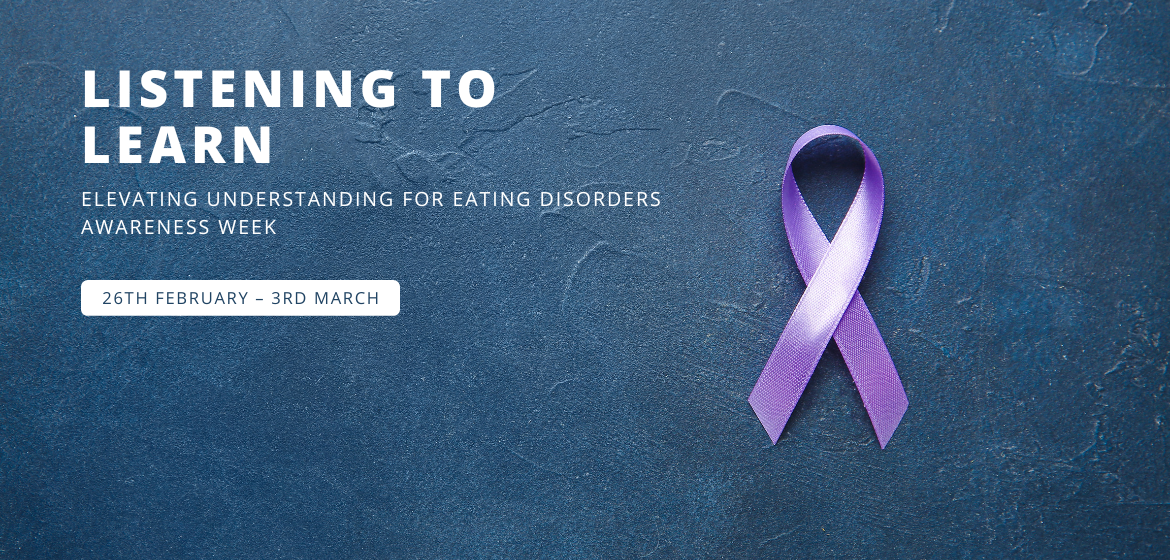
Listening to Learn: Elevating Understanding for Eating Disorders Awareness Week
Eating Disorders Awareness Week is a crucial moment on the calendar, shining a spotlight on a complex and often misunderstood set of conditions that affect millions worldwide. This annual event held this year from 26th February – 3rd March serves as a platform for education, advocacy, and support for individuals grappling with eating disorders. This article will delve into the significance of Eating Disorders Awareness Week, explore the spectrum of eating disorders, and discuss key insights to foster greater understanding and empathy.
Understanding Eating Disorders
Eating disorders are serious mental health conditions characterized by unhealthy eating habits, distorted body image, and often an obsessive preoccupation with food, weight, and shape. They can manifest in various forms, including anorexia nervosa, bulimia nervosa, binge-eating disorder, and other specified feeding or eating disorders (OSFED).
Anorexia nervosa involves extreme calorie restriction and an intense fear of gaining weight, leading to severe weight loss and malnutrition. Bulimia nervosa is marked by episodes of binge eating followed by compensatory behaviours such as purging, excessive exercise, or fasting. Binge-eating disorder entails recurrent episodes of uncontrollable eating, often accompanied by feelings of guilt and shame. It’s crucial to recognise that eating disorders can affect individuals of any gender, age, ethnicity, or socioeconomic background. Contrary to common misconceptions, they are not simply about vanity or willpower but rather complex conditions rooted in genetic, biological, psychological, and environmental factors.
The Importance of Eating Disorders Awareness Week
Eating Disorders Awareness Week plays a pivotal role in dispelling myths, challenging stigma, and fostering empathy for those impacted by these disorders. By raising awareness, we can promote early intervention, destigmatize seeking help, and advocate for improved access to evidence-based treatment and support services.
One key aspect of awareness is understanding that eating disorders are not always externally visible. While extreme weight loss or fluctuations may be evident in some cases, others may maintain a “normal” weight or even appear overweight. It’s essential to look beyond outward appearances and recognize the internal struggles and psychological distress experienced by individuals with eating disorders.
Furthermore, awareness extends beyond recognising the signs and symptoms to cultivating a compassionate and supportive environment. It involves listening without judgment, offering encouragement, and providing resources for professional help. Language matters too, avoiding stigmatising language and instead using person-first language can help promote dignity and respect for individuals living with eating disorders.
Challenges and Barriers:
Despite growing awareness and efforts to destigmatise eating disorders, significant challenges and barriers persist. These include limited access to specialised treatment, societal pressures around body image, and cultural attitudes that perpetuate harmful behaviours. Research has found that exposure to Instagram images that depict attractive and thin celebrities and peers was associated with higher body dissatisfaction levels, mediated by social comparison.
Moreover, the pervasive influence of social media and unrealistic beauty standards can exacerbate body dissatisfaction and contribute to the development or exacerbation of eating disorders, particularly among adolescents and young adults. Addressing these systemic issues requires a multifaceted approach involving advocacy, education, policy change, and community engagement.
Tips for Raising Awareness
There are several ways individuals and organizations can contribute to the cause:
- Educate Yourself: Take the time to learn about eating disorders, their risk factors, and available resources for support and treatment. Bodywhys has some great resources that can help.
- Spread the Word: Use social media platforms, community events, and other channels to share information, resources, and personal stories related to eating disorders.
- Advocate for Change: Write to policymakers, support legislation aimed at improving access to treatment, and advocate for increased funding for eating disorder research and support services.
- Foster Supportive Environments: Create spaces where individuals feel safe to discuss their experiences with eating disorders without fear of judgment or stigma.
- Prioritise Self-Care: If you or someone you know is struggling with an eating disorder, prioritise self-care, seek professional help, and lean on supportive friends, family members, or online communities.
Why Take Part in Spreading Awareness
Eating Disorder Awareness Week serves as a poignant reminder of the importance of empathy, understanding, and action in the fight against eating disorders. By raising awareness, challenging stigma, and advocating for change, we can create a more inclusive and supportive society where individuals with eating disorders receive the compassion and resources they deserve. Let us seize this opportunity to educate, empower, and inspire change – not just for one week, but every day of the year.
Online Talk Hosted by Dr. Mou Sultana
As part of Eating Dosorcer Awareness Week we’re hosting an online talk presented by Dr. Mou Sultana on Saturday, March 2nd from 4 – 5 pm. If you’re interested in attending you can register today.

























